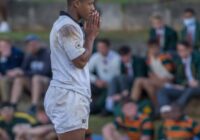1 February 2023
Dear Parents,
I watched an “unfortunate” run out in an U14 cricket match on Saturday. Our two batsmen were both distraught in the realisation of their predicament… an avoidable error, but, as is always the case with cricket, it brought an abrupt end to the dream of a glorious 50-run innings and an unbroken winning partnership.
On the basketball court, I watched attempt after attempt at trying to get the seemingly oversized ball into the hoop at both ends of the court… the frustration level might rival that of most weekend golfers!
At least the frustrations of missing a shot in the water polo pool are masked a little by the reprieve of being in a swimming pool on a blisteringly hot day.
Our Grade 8s embarked on a raft-building exercise on Sunday morning, amidst the intermittent rain and mist that epitomises Hilton. Getting up, showing up, ultimately levelling up regardless of the conditions is what it is all about.
The lessons learned on the sports’ fields and during outdoor activities are precursors to challenges faced later in life. I think of an investment decision that may go south just when all indicators pointed to a sure return; or a DIY project that falls apart at the first test of its strength; or perhaps a natural disaster that undoes all one’s hard work and meticulous planning – we in KZN know all about this.
The point I want to make is that one of the reasons for our playing sport at school, or trying difficult outdoor pursuits, lies in the lessons it teaches young people in preparation for life. As such, winning and losing, achieving a high score or losing one’s wicket cheaply, are all important and necessary in one’s personal development – and the critical life skill of resilience is hopefully learned in the process.
This must all seem quite obvious.
However, what does alarm, intrigue and disappoint me at times, is the adult / parent response to these sporting mishaps when they happen.
We all want our child to succeed; we all want him to receive affirmation from his peers and coach; success provides this. Our goal, as an institution of learning, is to prepare your son for life – life outside the narrow confines of our little world. As such, it is in dealing with disappointment after a poor decision or a repeated miss or a frustrating passage of play that courage and character come to the fore.
As adults we need to encourage, to praise, to celebrate our child for whom he or she is and for whom he or she may become – regardless of his or her success rate on a Saturday.
Boys in particular feel every aspect of their failure when a mistake happens – a dropped catch or a run out etc. Their need at this time, although they may not admit it, is for acceptance – to hear that it’s not the end of the world – to know that their worth transcends their performance.
Teenagers can be cruel at moments of disappointment and frustration. Our coaches are encouraged to help our boys respond as a team, to have each others’ backs, to ensure the support each boy deserves as he develops through the highs and lows of success and failure. Sometimes even our coaches’ zealous fervour needs to be tempered.
The added challenge of livestreaming our sports matches, which has some great advantages, unfortunately also brings frustratingly unhelpful opportunities for boys and parents to elevate a boys’ sporting fixture into the realm of a quasi-professional event. We lose perspective and this gets me wondering whether the benefit does indeed outweigh the potential downside… perhaps we have gone too far? A subject for another day.
And so, as parents on the journey of training and teaching your son, may I ask you to comfort rather than criticise when failure occurs; to encourage rather than chastise when unnecessary school-boy errors happen.
Life is filled with achievement and disappointment. How we deal with both is a direct reflection of our character.
Kind regards,

George Harris
Headmaster





